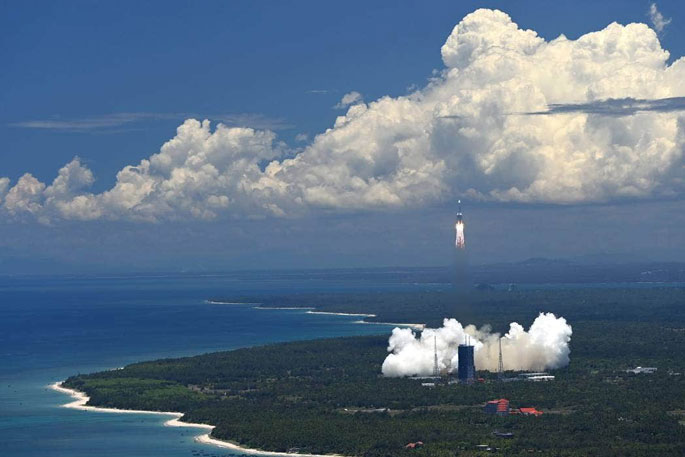A 30-metre long, 21-tonne stage of a Chinese Long March 5B rocket, with an orbit that takes it over New Zealand, is falling to Earth.
The rocket was launched last week, carrying the first module of China's space station into orbit.
The station module successfully entered its planned orbit, but the core stage of the rocket is now also in orbit and expected to make an uncontrolled re-entry in the next week.
The core stage is about 30m long and 5m wide, Space News has reported. Its orbital inclination means it reaches as far south as Wellington and southern Chile and a little to the north of New York and Beijing.
The core could make its re-entry at any point within that area.
Much of the rocket section is likely to burn up in the intense heat created as it enters the Earth's atmosphere, but given the size of the segment some debris could make it to the ground.
While any debris that does make it through will most likely fall into the ocean or onto areas of uninhabited land, it is possible some could fall over inhabited areas.
It is impossible to predict where or when the debris will hit the Earth, and variations of just a few minutes could change the re-entry point by thousands of kilometres.
US government-funded research organisation The Aerospace Corporation has predicted re-entry will be about 1pm on May 10 over an area well out in the South Pacific Ocean, but the prediction has leeway of 41 hours before or after the chosen time.
Live Science has reported the core has been picked up on ground-based radar, tumbling through orbit. The US military has designated the object 2021-035B.
A year ago debris from another Long March 5B rocket core came crashing back to Earth.
That time re-entry of the 17.8-tonne rocket segment happened over the Atlantic Ocean off the west coast of Africa, but only 15 minutes after it had been directly over New York city.
Some debris was reported to have crashed into inhabited villages in West Africa but there were no reports of anyone being hurt.
The last time a heavier object made an uncontrolled re-entry was in 1991, when the 39-tonne Salyut-7 Soviet space station re-entered over Argentina.
The biggest uncontrolled re-entry was of the 69-tonne Skylab in 1979, with debris landing over Western Australia and the Indian Ocean.



1 comment
What goes up...
Posted on 05-05-2021 12:50 | By morepork
Wouldn't you think that people who have the technology to launch such an object, would also have the technology to ensure it is safely destroyed or landed when it has served its purpose?
Leave a Comment
You must be logged in to make a comment.